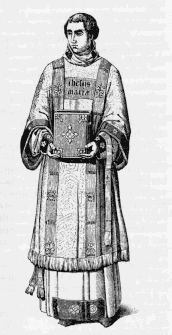Meet the Middle Ages
BackPriests

The priests, or the clergy, were influential in the Middle Ages. They were exempt from tax because they provided spiritual care and conducted religious services to their parishioners.
The priests were part of daily life during the Middle Ages. You met them every Sunday in church, they taught at the school, they administered Holy Communion, preached and told tales of the saints. The clergy also took part in everyday life. The priest was a person to confide in. He listened to confessions and gave advice on how one should lead ones ´s life. The priest met his parishioners on ordinary work-days as well as on holidays.
The Bishop was a much more prominent member of the clergy than the ordinary country priest. The bishops and the town priests were often learned men with years of studies behind them, they had often been to universities abroad. They could speak and write in Latin. Mostly, they belonged to the nobility or a wealthy town family. The bishops were respected, as they were members of the Council and helped to govern the country. A country priest did not have this kind of education at all, and his knowledge of Latin would have been very limited. Usually, he was the son of a townsman or a peasant. His life was very similar to the life of an ordinary peasant.
Priests and bishops made their living from the so-called tithes, a special fee paid by the peasants. A tenth of the crops and a tenth of the meat was to be given to the church. A third of this was used for the upkeep of the clergy - the rest was shared by the church, the Bishop and the poor. The money which belonged to the church was used to buy books and candles and for repairs.
Read more about priests and the Church under "Society. The Church", "Town Life. Churches, Monasteries and Nunneries" You can read about people ´s beliefs under "Society.Life and Death"